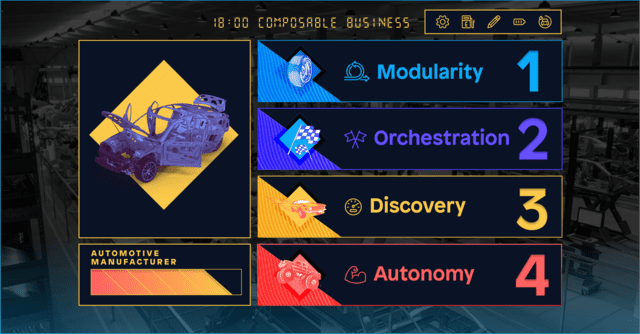The June 2022 edition of the Automotive Disruption Radar lists 26 different drivers of rapid change in the automotive industry. From securing microchips for autonomous vehicles to adhering to carbon dioxide legislation to building out electric vehicle infrastructure, automotive manufacturers are wrestling with complexity and constant change on multiple fronts.
The relentless need to anticipate and outrace the waves of disruption sweeping through the industry has automotive manufacturers trying to squeeze every drop of speed and agility out of their processes. Digital transformation has been the most attractive strategy for this optimization. Companies that successfully undergo a digital transformation initiative enhance their ability to create higher-quality, more customizable products at a lower cost.
But successful digital transformation initiatives are the exception rather than the rule: 70% of them fall short of their objectives. To better those odds, automotive manufacturers are educating themselves about a concept that dramatically improves an organization’s powers to predict and respond to sudden shifts in technology, the marketplace, and customer needs. That concept is the composable business.
What is a composable business?
According to Gartner, the composable business is the future of business. Gartner first coined the term to describe an organization architected “for real-time adaptability and resilience in the face of uncertainty.” The four principles of the composable business, as laid out by Gartner, are:
- Modularity
- Orchestration
- Discovery
- Autonomy
At its core, the composable business is about modularity. Automotive manufacturers that construct their business elements from easy-to-build, interchangeable parts can more quickly and easily create, update, or swap out those elements in response to a disruptive event. Composable business elements can include products, services, responses, experiences, and organizations.

Along with modularity, a composable manufacturer needs to dedicate itself to orchestration. A digital transformation initiative is a whirlwind of change. To manage and deliver that change, a composable manufacturer must free its business units from the silos keeping them from effortlessly coordinating initiative efforts, sharing data, and collaborating on creating applications.

The third principle of the composable business is discovery. Automotive manufacturers not only must cope with disruptive change from outside the company, but from within it as well. Better ways to do things are always bubbling up through the organizational ranks. The composable manufacturer encourages those ideas and puts systems in place to reward, refine, and implement them. Being a composable manufacturer means not only surviving disruption, but thriving from it.

Cultivating a culture of autonomy
The most effective way to profit from disruptive change is to get out of its way. Trying to impose a cumbersome top-down strategy on the digital transformation that fuels a composable business is the surest way to short circuit the benefits to be gained from your transformation: agility and adaptability.
That’s why the composable manufacturer will look for every opportunity to cultivate a culture of autonomy. A company is only as quick as its slowest business unit. By granting its business units the freedom and resources to identify disruptive opportunities and immediately act on them, the composable manufacturer accelerates the agility and adaptability of the entire organization.

Understandably, acting quickly is often going to lead to failure. But the composable manufacturer understands that failure is essential to growth and learning. The important thing in an autonomous culture is to encourage failing small and failing fast. The more quickly you learn the lesson of your failure, the more quickly you can put that lesson to practice.
Why low-code is the perfect composable business tool
After embracing the four principles of the composable business, the next step for the disruption-embracing automotive manufacturer will be to gather the tools necessary to act on those principles. More and more automotive manufacturers are finding that a low-code application development platform is the tool that matches up perfectly to the principles of the composable business.
Low-code applications are built from modular elements. These elements can be shared across the entire enterprise, encouraging the creation of apps that break down silos and knit together organizational endeavors. With every business unit accessing applications and templates from a shared library, there are ample opportunities for solutions developed in one corner of the company to be discovered by a team at their wit’s end in another. And the intuitive and visual Mendix low-code interface lets citizen developers of every ability exercise their autonomy by creating apps perfectly designed for their particular challenges.
As intuitive as the principles of the composable business might seem, adopting them requires commitment and investment by automotive manufacturers. Companies will need to rethink and, in some cases, rearchitect their existing systems, ideally using the modular capabilities of a low-code application development platform.
To learn more about how the composable business will help automotive manufacturers embrace disruption, download our eBook.

